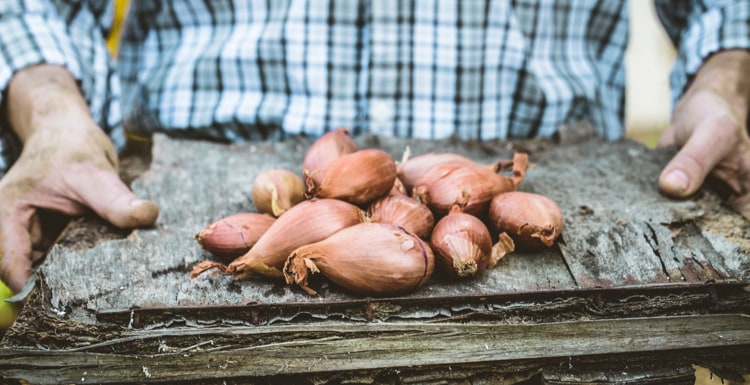

For most people, cooking a meal at home just isn’t whole without garlic or onions. Harsh breath aside, garlic and onions (allium vegetables) possess potent health-building properties. But for a few people with poor digestion, alliums are just no fun. Chef V explains why garlic and onions can lead to indigestion.
Here’s a little health tip that you can try at home. Just make sure you have some mouthwash handy: eating raw garlic and onion may be two of the best things to eat for your gut.
That’s because they both contain prebiotic fiber. You’ve heard of probiotics (friendly bacteria in your gut) but in case you don’t know what prebiotic fiber is, it’s basically the preferred source of food for your beneficial gut bacteria.
If you feed your gut prebiotic fiber, the good bacteria will feast on the undigested fiber in your colon and produce short-chain fatty acids. Pretty much every single health benefit you can think of, from emotional well-being to your immune system depends on short-chain fatty acids.
So does this mean you should be eating garlic and onions by the handful?

The Health Benefits of Alliums
Garlic and onions are members of the allium family of plants. Leeks, chives, and scallions (green onions) are also alliums.
Besides being used to flavor dishes, there are some very good reasons to eat a lot of alliums. They are rich in vitamins and minerals and contain compounds that are believed to fight disease.
For instance, a 2017 study in Evidence-Based Complementary and Alternative Medicine says that alliums are rich in organosulfur compounds, quercetin, and flavonoids, among others. These compounds, says the research, have the following properties:
● Protect against cancer
● Cardiovascular disease prevention
● Anti-inflammation
● Prevents obesity
● Fights diabetes
● Contains antioxidants
● Kills germs
● Protects the brain and immune system
Moreover, several studies, says a research article in the Asian Pacific Journal of Cancer Prevention, have shown that a higher intake of allium products is associated with reduced risk of several types of cancers.
Besides bad breath, is there any reason not to eat these most common alliums by the bulb-full? Maybe there’s a good reason why Mediterranean cultures eat a ton of garlic and seem to have less chronic disease than Americans? Garlic is thought to be one of the most powerful foods for keeping the arteries clear of plaque buildup.
As for onions, it’s an excellent non-citrus source of vitamin C. Both garlic and onions are excellent for people trying to manage their blood sugar levels.

The Downside Of Alliums
But before you go eating bulb after bulb of garlic and onions, keep in mind that not everybody can tolerate alliums very well. It’s hard to say how many people have a true allium allergy.
Unlike Celiac Disease, which we know affects roughly 2 million people in the U.S, there's no reliable data on garlic and onion allergies. Relatively few people are probably truly allergic to alliums but there are many people who are intolerant of them.
So what’s in garlic and onions that cause bloating, gas and other digestive upset? The reason why is that alliums are high in FODMAPs. FODMAP stands for fermentable oligosaccharides, disaccharides, monosaccharides and polyols. Basically, these carbohydrates are very hard for some to digest.
For people that have to eat a low FODMAP diet, eating alliums can cause the small intestine to poorly absorb the sugars in the onion and garlic. The sugars then ferment in the colon (large intestine), causing gas or other symptoms. But only a few people - who need to eat a very low FOD map diet - cannot tolerate alliums. For 99% of people, they are fine.
Fructans in Garlic and Onions
The main offending carbohydrate in alliums is called fructan, which is a chain of fruit sugar (fructose) molecules. Fructans represent the ‘oligosaccharides’ in FODMAPs. Garlic is especially problematic because it contains one of the highest levels of fructans in the plant world.
Unfortunately, there’s no magic pill you can take to break down fructans like you can a lactase enzyme for dairy. That means if you eat at a meal with lots of garlic and onions, you may experience abdominal pain, acid reflux or constipation.
In general, it’s a great idea to get more prebiotic fiber in your diet. More prebiotic fiber means better gut health. But not everybody tolerates prebiotic fiber (fructans and inulin, which is a polysaccharide).
Elimination Diet
If you have trouble digesting alliums, I suggest giving them up for a few weeks along with every other type of food that may be triggering food sensitivities. That means no gluten (wheat), soy, and the most common other food sensitivity triggers: artificial sweeteners, caffeine, MSG, dairy, tree nuts, shellfish, peanuts and eggs.
That bit of advice may seem overwhelming because what’s left to eat? But if you have serious digestive issues, I highly recommend working with a nutritionist who can help you discover the root causes of your digestive issues.
The good news is that after a few weeks, you can start reintroducing some of these foods back into your diet, one at a time.
And if you love garlic but it doesn’t love you back, here’s another piece of advice. Buy garlic-infused olive oil. It’s low in FODMAPS so it won’t trigger any food sensitivities.
Just don’t forget to brush and use a strong mouthwash.


